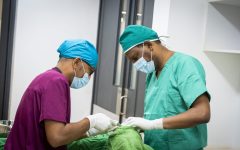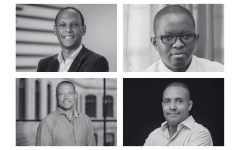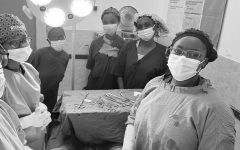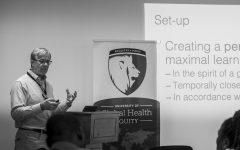MGHD’22 Student and GSRH Scholar, Emmanuel Okiror, Advocates for Men’s Involvement in Gender Equity and Women’s Sexual and Reproductive Health
April 4, 2022 2022-04-04 7:57MGHD’22 Student and GSRH Scholar, Emmanuel Okiror, Advocates for Men’s Involvement in Gender Equity and Women’s Sexual and Reproductive Health
MGHD’22 Student and GSRH Scholar, Emmanuel Okiror, Advocates for Men’s Involvement in Gender Equity and Women’s Sexual and Reproductive Health
The Master of Science in Global Health Delivery program at UGHE prepares students to work in health care delivery settings across the globe by emphasizing hands-on and practical field experience and a focus on “systems” rather than symptoms, which drew Emmanuel Okiror to apply, particularly to the Gender, Sexual, and Reproductive Health track.
“As a Senior Reproductive Health Officer at the International Rescue Committee working in a humanitarian setting, I was already seeing a career path in sexual reproductive health. Even though I was completing my master’s in public health, I still coveted more knowledge in sexual reproductive health.”
While attending a certified program in Global Health Delivery at Harvard University, where he was first introduced to global health and met the late Dr. Paul Farmer, who was teaching one of his courses, Emmanuel became deeply interested in global health delivery and developed a desire to pursue it for a master’s degree.
“During the course, I learned a lot from the late Dr. Paul Farmer and his colleagues, and I became so interested in global health delivery that I began looking for an opportunity to pursue it at the master’s level,” he said. I explored assorted options and discovered the University of Global Health Equity (UGHE). After learning about its master’s program, I knew it was exactly what I needed.”
Now a Gender, Sexual, and Reproductive Health Scholar in the MGHD program, together with other students in his cohort, Emmanuel Okiror is being taught to address the critical social and systemic forces causing inequities and inefficiencies in health care delivery and they are being challenged to consider the bigger picture when they are aware of the broader social, political, and environmental factors that affect health.
When UGHE’s students experience life on campus and during community field visits, the first traits they notice at UGHE are compassion and humility, and they all agree that it is something unique about UGHE that prepares them to address inequities genuinely, not just because they are studying about it, but because they lived to give value to everyone, especially the vulnerable communities around them.
“Arriving at UGHE’s beautiful campus in Butaro, Rwanda, I was mesmerized by how the faculty, staff, and students live in harmony and as a family, with no one caring about titles but that we are all equal and humble.” The late Dr. Farmer, for example, would freely sit, chat, and walk with students, as well as interact with vulnerable people in Butaro communities and hospital, which distinguishes UGHE from other universities.”
As a male midwife in Uganda at the start of his career, he witnessed the suffering mothers went through while giving birth and how some didn’t have access to the quality maternal services they needed, especially in rural areas, he developed an ardent interest in gender and sexual reproductive health, especially advocating for gender equity, which affects sexual reproductive health services and healthcare delivery as a whole.
“You can’t separate reproductive health from gender because reproductive health is influenced by gender, and gender inequalities have an impact on women’s reproductive health.” In terms of gender power imbalances and discrimination, I truly believe that patriarchy still exists in our communities. We live in a society where male dominance is still acknowledged and accepted as normal.”

Gender equity cannot be achieved solely through the efforts of women; it takes a collective effort and the involvement of men to dismantle the stereotypes and discriminations that prevent gender parity in various fields. UGHE believes in collaborative efforts that include men as partners in breaking down gender barriers to health care, particularly sexual and reproductive health. Emmanuel reveals his plan to advocate for gender equity and calls on other males to do the same as a student at UGHE learning how to examine gender-based violence that objectifies and excludes women for certain roles and positions in the gender and sexual reproductive health class.
“I believe that things can be changed, and that change must begin with men. I want to use the skills I’ll gain from this program to become one of the few men who will defy what society has prescribed as gender roles and gender discrimination as the norm. I intend to collaborate with like-minded colleagues on projects which entail male involvement in maternal and child health, gender equity advocacy, and promotion of sexual and reproductive health.”
The MGHD program in Gender, Sexual Reproductive Health is equipping Emmanuel Okiror to achieve his personal mission; designed to equip the next generation of global health professionals with the tools and knowledge to apply the guiding principles of global health – collaboration, innovation, leadership, and equity – to serve vulnerable communities around the world and he hopes to leverage his MGHD skills to contribute to gender equity.
“I intend to use my role as a global health leader to help create a world in which equal opportunities are given to both females and males and where gender discrimination is no longer a barrier to accessing sexual and reproductive health services for women”








